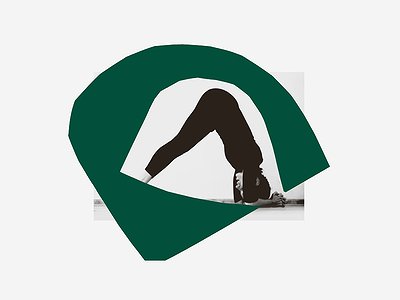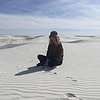Name: Félicia Atkinson
Nationality: French
Occupation: Producer, Sound Artist
Current Release: Hand in Hand on Shelter Press
Recommendations: I just read the «novel» I love Dick by Chris Kraus. It’s funny, annoying, smart, dark, profound, superficial, sexy, disgusting, and brillant like a stolen bottle of champagne. I loved it.
I am always in awe of Etel Adnan's paintings, tapestries, and poems. Thinking of her makes me always happy and give me courage when I feel weak. She was born in 1925 in Beyrouth and her work is the more dynamic, alive and youthful than anything I know.
Contact/Website: If you enjoyed our interview with Félicia Atkinson, why don't you visit her website, bandcamp site or facebook profile for more news and updates?
When did you start writing/producing music - and what or who were your early passions and influences? What what is about music and/or sound that drew you to it?
Born in 1981, I grew up in Paris and had the chance to learn the harp and the piano for free as a kid, but also to discover theatre, and to go to see many exhibitions and music shows for not a lot of money. As a young student I would go to see experimental shows at Les Instants Chavirés, Presence Electronique Festival, as well as rock venues and jazz festivals in the parks during summer. But it took me a while to allow myself to start music. I guess seeing mostly guys on stage didn’t help at that time, even though as a kid, my idols were, like for many girls being a teen in the 90s, PJ Harvey, Björk, Cat Power and Kim Gordon. These were the ladies that helped me to imagine the possibility that a woman could be on stage, and not only a listener.
I started with several duo / collective projects in Paris, where I grew up: A band called Stretchandrelax with my best friend Elise Ladoué, a duo with Sylvain Chauveau and a band called Louiseville. It was the moment of myspace, and also I bought my first laptop at 25 and in combination with my own Internet connection, it help me to get connected with people abroad.
Stretchandrelax was a feminist experimental /performative duo where we were wearing costumes and making reductionist improvisation and Musique concrète, from around 2005 and 2009. I am still working with Elise now, doing other projects together.
With Sylvain Chauveau and Louiseville, I was more involved in spoken word, almost at the same time period around 2006-7. It was a period were spoken word and musique concrète were less «à la mode» in Paris and I must admit that people didn’t really care about those projects. Which in a way was a good thing, since it allowed me to feel very free to experiment without any goals of attaining success.
What drew me to play music was first experimental poetry. I wanted to do «poésie sonore», watching poets perform such as Christophe Fiat or Anne-James Chaton. I also felt very inspired by contemporary dancers collaborating with musicians, like for example Simone Forti with Charlemagne Palestine. Then I moved to Brussels after studying at Les Beaux Arts de Paris, in 2008 and began my solo projects. I released my first album on my own on Spekk records, a great Japanese label for experimental music. A bit later, I met Bartolomé and he became since then - and continues to be - a strong source of inspiration to me. We discovered a lot of music together, and he really helped me to gain more confidence in myself and my music. We also created Shelter Press together.
For most artists, originality is first preceded by a phase of learning and, often, emulating others. What was this like for you? How would you describe your own development as an artist and the transition towards your own voice? What is the the relationship between copying, learning and your own creativity?
I don’t know how to do something the same way twice, which can be a good or a bad thing, depending the context. In a way it prevents me from copying, because even if I would, I could not. Also, to me ,admiring something or someone does not mean to me that I want to be it / him / her, often the opposite actually. I am more interested in learning. But learning with deviations.For example, reading Don Delilo or Joan Didion is for me a way to learn how I want to play my music. Watching an Antonioni film inspired me to create a sculpture, and listening to Neil Young pushes me to cook something. In that way there is always a loss and a translation that prevents me from copying. I find the act of copying too difficult to do and boring at the same time. To be honest, I am too lazy and clumsy to do that!
What were your main compositional- and production-challenges in the beginning and how have they changed over time?
Composition and production to me are connected by the thread of its context, where / how / when to record and play. When I started recording, especially under the moniker Je Suis Le Petit Chevalier, I was very excited by the cassette scene, which allowed me to release almost everything I was recording. I felt a lot of support from that scene and it is because of them that I do what I do now. Spending time in the cassette scene was very invigorating and allowed me to discover my music practice step by step. I am always a bit skeptical by instant exposure. What can you control of it? I believe in the learning of making errors, and being underground is a good way to have the time to play with mistakes in your creativity.
Now, I am more focussed on releasing less and taking more time for each project, but it’s important to me that the roots of this selective process are in this overly productive self-releasing scene. The fact that I still self- release my records on Shelter Press is not by chance. It’s a way for me to keep that spirit in mind. The fact that we are two people running Shelter Press, Bartolomé and me, is also very important, because it means that I can confront what I do to the judgment and trust of someone else, someone who can tell me «your album still feels a bit unresolved», etc … The challenge is always also this: sharing your music with the musicians you admire and love. Their feedback is always very important to me.
What was your first studio like? How and for what reasons has your set-up evolved over the years and what are currently some of the most important pieces of gear for you?
I never had a proper studio. I mostly record with my iphone, sometimes a Zoom, and my computer. My studio is nomadic and swallows the landscapes it crosses. I love the sound of a Fender Rhodes but I don’t own one, I enjoy recording fires, birds and discussions. I love to record voices under a blanket to keep a very muffled sound. I work a lot on my music on the train, with headphones. I recorded at EMS studio in Stockholm and that was a great experience though, playing with Buchlas and the SERGE. I will go the electronic studio in Melbourne this Summer and I am very excited about that, too.
How do you make use of technology? In terms of the feedback mechanism between technology and creativity, what do humans excel at, what do machines excel at?
I am a sucker with technology. I bought Logic Pro last year, until then I was using only garage band. I love to use machines I don’t understand. I use machines in an empirical way, very rarely reading the manuals. I wish I could drive that way without killing myself. If I could do that I would have had my driving license for a long time (which I don't)!
I am not against technology, it’s just that I love to receive from them a certain sense of mystery and facility, wich is often an antagonism. But, for example, last November, I had great conversations with a mid-size Buchla (I don’t remember the exact name) at EMS last November. I felt like aliens were speaking through it.
Production tools, from instruments to complex software environments, contribute to the compositional process. How does this manifest itself in your work? Can you describe the co-authorship between yourself and your tools?
Sampling is good. I have no problems using midi sounds, or picking sentences in books that I enjoy reading for my lyrics. I love the Beat Generation because of that. I like to borrow things. To make cut- ups. Also, as a woman, I feel it’s important to re-interpret, re-phrase things or sounds that were said by men, and perform a «sex change» operation on them.
Collaborations can take on many forms. What role do they play in your approach and what are your preferred ways of engaging with other creatives through, for example, file sharing, jamming or just talking about ideas?
My first way of collaborating was creating Shelter Press with Bartolomé Sanson, we are on a daily dialogue basis, opening our house to the people we’re making books and records with. I was also an art professor for the past five years of my life and seing art students every week is a strong way to exchange ideas and practices. I love to listen the mixes and podcasts my friends make, it’s a lovely way to discover new music that I never heard of.
My collaborations with the musician Jefre Cantu Ledesma, but also with the contemporary dancer Elise Ladoué are great ways to push myself into other creative territories.



